It was the 2nd January 2011 and I awoke to the steady sound of dripping water. I was in my camper-van, my head buried deep under a warm duvet. I’d driven through the previous night until I could drive no more, and parked at the roadside in some small roadside town. As I rose from deep slumber with my eyes still shut, I tried to piece together where I was and how I had got here.
‘Drip-drop, drip-drop!'
I remembered that I’d driven from the UK down through Spain and then taken a ferry across to Morocco during a spectacular sunset. The ferry had cut through waters so calm it was like a knife slicing mercury. The burning sky was reflected in the sea so perfectly that it was hard to make out the horizon. I thought how the red and orange reflections of the burning sunset paralleled memories of forgotten blood – spilled over the centuries as countries fought for control over this prime economic seaway.
I remembered a previous journey. I’d driven along Morocco’s northern coast at the base of the Riff mountains infamous for hashish farms. I’d come across small harbours and been stunned by the speed-boats – sleek white angular “bullets” with multiple huge outboards on the back, that made anything in a Bond movie look like a toy. Engines that unleashed, could make the crossing to the Spanish beaches and back before the Spanish Coastguard could say “Que Pasa?”
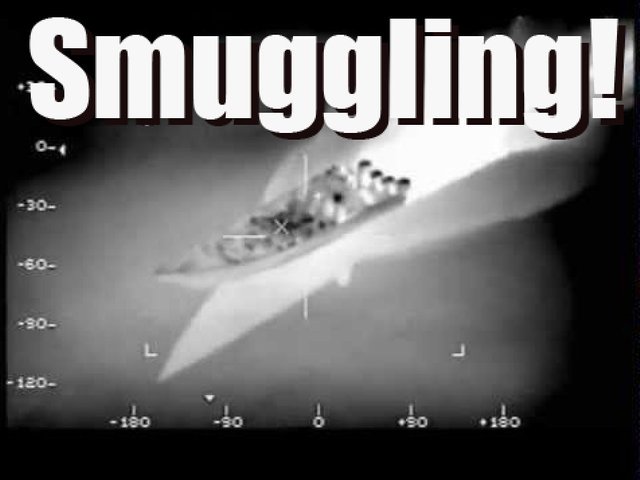
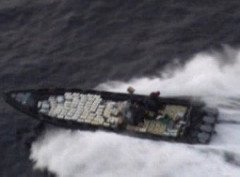
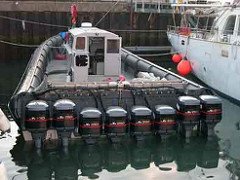
I thought about these fast boats as I hung over the ship’s rail, watching the waters ripple. I’d imagined that tonight would be a good night for the smuggling boats to ply their trade across this small stretch of water that separates Africa from Europe.
It seemed a pretty safe business. If the Spanish Authorities manage to corner a speedboat, the cargo is simply ditched overboard before the coastguard reach them. On the quieter Spanish beaches, grinning locals had told me stories of large waxed bundles being found. The authorities rarely get there first – but when they do it makes front-page news.
Tonight’s calm waters would offer a safe opportunity to cross. I’d also read about the creaky old wooden boats – light in value, heavy with dreams – that don’t always make it across. Old wooden fishing boats overladen with a less profitable cargo... humans. Each person will have paid with his or her life savings – a mere handful of hashish would have the same value.
It’s not so exciting when this cargo gets washed up. The Guardia Civil are called and the bodies are quietly laden in vans. Such incidents have superficial mentions – small paragraphs deeply interred at the backends of local newspapers.
‘Drip drop drip drop.’
I arose and cursing the leak in my van roof, opened my camper door to find a bright sunny morning. My eyes focussed on a long line of locals arriving to the town by donkey and horseback.
It was market day.
‘Clip clop, clip clop.’
It had not been raining and my van was not leaking, the noise was the hooves on the road. The brightly coloured farmers sat side-sadle and bounced in time to the trot of their animals – a surreal dance.
Soon I was sitting on a broken metal chair in a café beside a broken tarmac road, resting my arm on a broken plastic table. An old man with a worn, wooly, tea-cosy hat pulled tightly over his head, made tea. His eyes sparkled from his deeply lined and sun-worn face. He thought it was cold – I was in a T-shirt. His gums had receded to reveal a few very long teeth that were somehow still attached. With the metal pot held high, he poured me the sweetest mint tea I’d ever tasted.
A young boy of 10 on a beaten bike, that barely worked, skidded to a halt in front of me by a discarded broken
CD. He carefully arranged it in the spokes of his wheels along with others he’d salvaged. I realised what he was up to. The embedded CD's would make a psychedelic colour when the wheels span.
He reminded me of my friends and I as kids. We built our own bikes and added cardboard to the back wheels which would flick on the spokes and sound like an engine – so we could look and sound like the big boys.
He cycled off with a happy carefree arrogance. I could see nothing worried him. He was young enough to believe everything in life is possible. I watched him transfer some vegetables from one stall to another. He was earning tips. He was a survivor. An entrepreneur in the making. I could see it. He had an energy that stood out in the market. Everyone else was getting on with routine. He was thinking, working out how he could make this environment work for him.
I imagined him returning to his family with his spoils of his adventures – a few coins and some fruit or veg. I could see the smiles on his mother’s face.
I thought that – at some point as he grew older – he could take a look around and, with the same calculation, realise it he could not better himself or his family any further in this small rural town. He would have heard about Europe and its streets ‘paved with gold.’ He would eventually attempt the crossing himself.
Like a young bird, full of trepidation, looking out of its nest high in a tree– he’d flap his wings, make the jump... and, hopefully, fly.
I’d not even finished my tea before I realised this scenario could serve as a link to the bigger picture.
The story of a plucky young kid connected to the drowning of a young man, barely recorded.
The story of a young boy growing could make framework for a film highlighting the plight of young boys and men like him.
A story that would communicate the passions, reality and dreams that made men and women dare such a dangerous crossing to a ‘better life.’
A story that would nudge the viewers to the reality that the very people that dared to migrate are not some rejects of a society - but the cleverest, most daring and entrepreneurial of their society.
A story that would stop people seeing the body toll not as some rubbish that the sea washes up - the waste of another society - but as a terrible human tragedy with deep ramifications.
These migrants dared this journey not to buy better clothes or shoes, but to feed hungry mouths back home - to care for their loved ones and dependents.
Through the fictional character MoMo boy I wish people to understand and feel for them.
To realise their unique individual lives.
To feel for their desperation.
To realise their bravery in undertaking such a trip.
This is a brief timeline since I started the film project
- 2011 - Estimated that 1,500 people drowned trying to cross from Africa to Europe.
- 2013 - In October 2013 the story finally hit the worlds headlines when one single boat went down off Lampedusa in Italy with over 360 lives lost. 360 lifes, 360 dreams denied and 360 individual stories of bravery and adventure. Local fishermen mistook the people's screams for the sound of seagulls. These are some drawings from the island's young children.
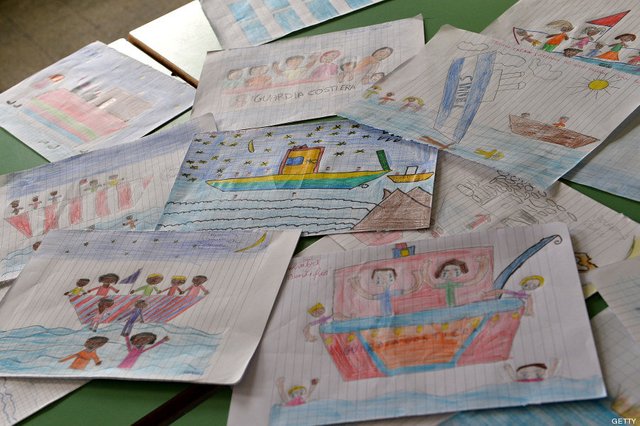
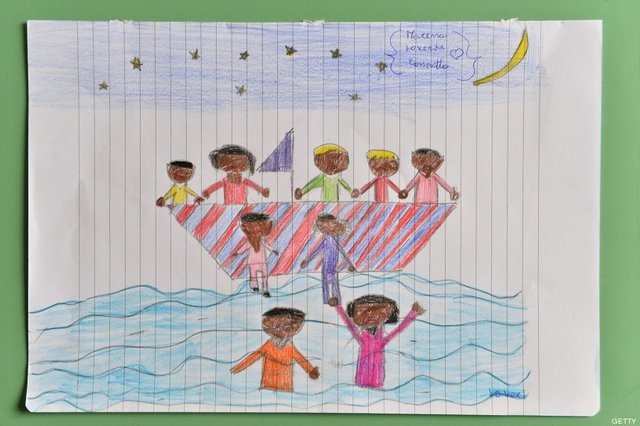
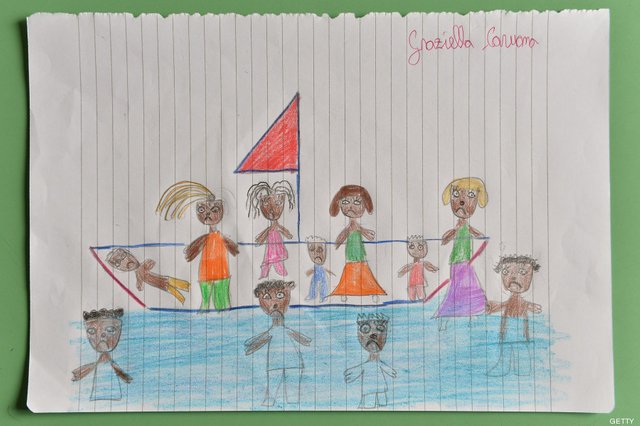
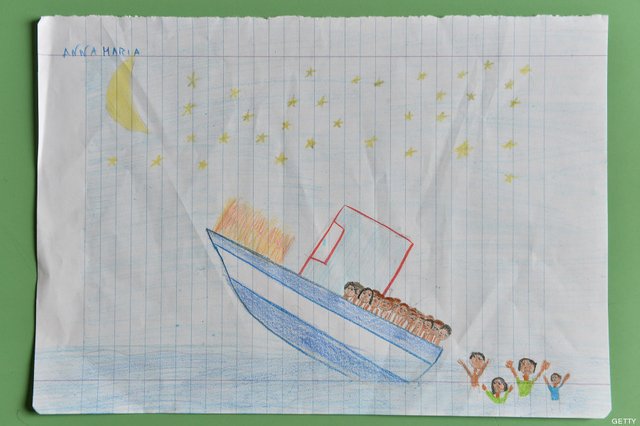
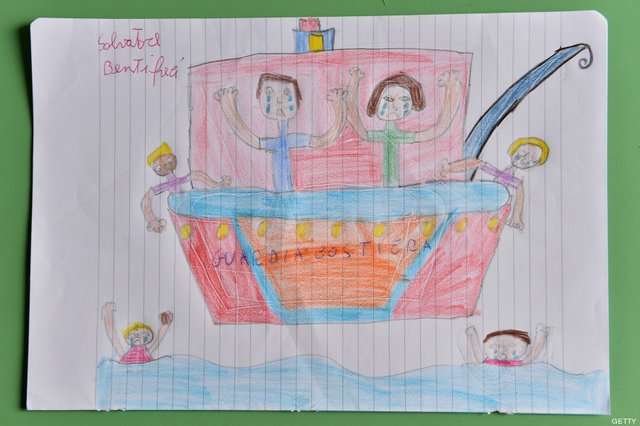
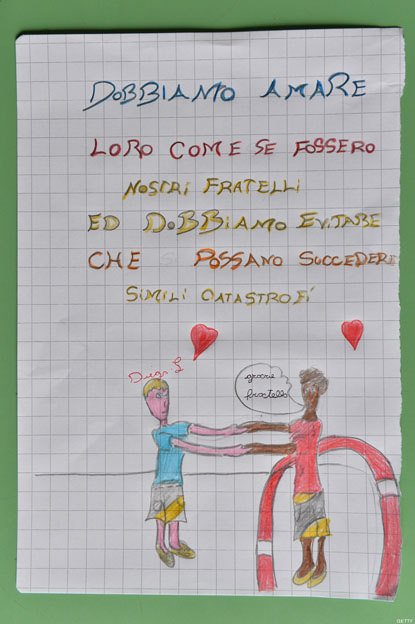
- 2013 - Later in October 92 migrants were found dead in the Sahara after being dumped by smugglers. They were nearly all women and children.
- 2014 - 3,419 people drowned trying to cross from Africa to Europe
- 2015 - April- Around 900 people drown when one boat sinks, making it the largest maritime disaster since WW2 1,308 people drown in the one month of April 2015.
- 2015 August - a photograph of a drowned young boy circulates via social media which shocks the European population to the ongoing tragedy.
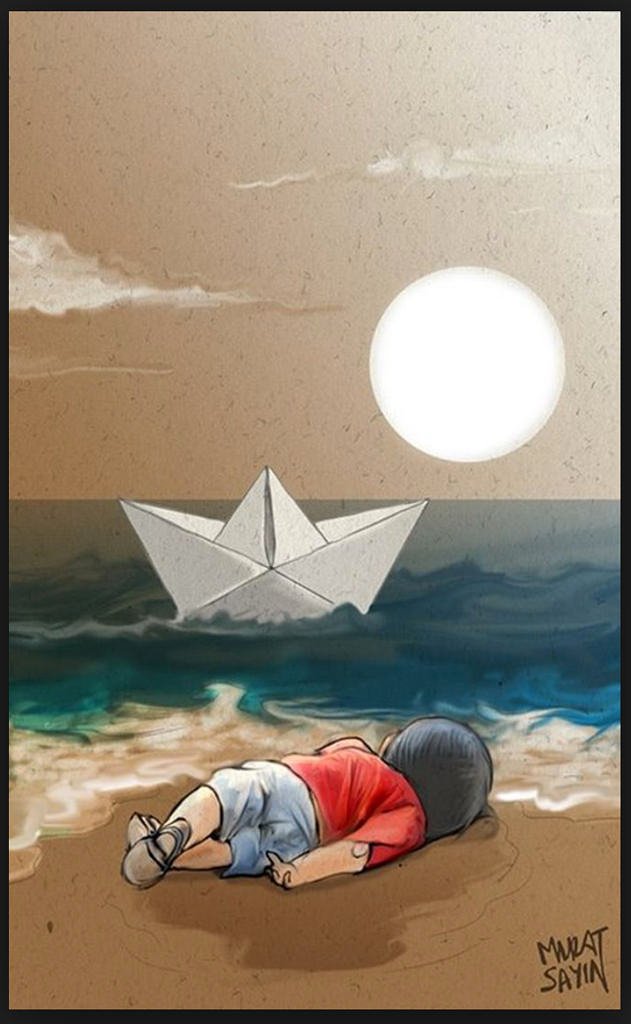
- By 2017 the story has left the media’s attention but the drownings continue with nearly 2,000 drownings already this year. I have completed a few drafts of the screenplay. We have not secured finance to make the film - yet. I have also started turning the screenplay into a novel...
This is a mocked up poster for the film.
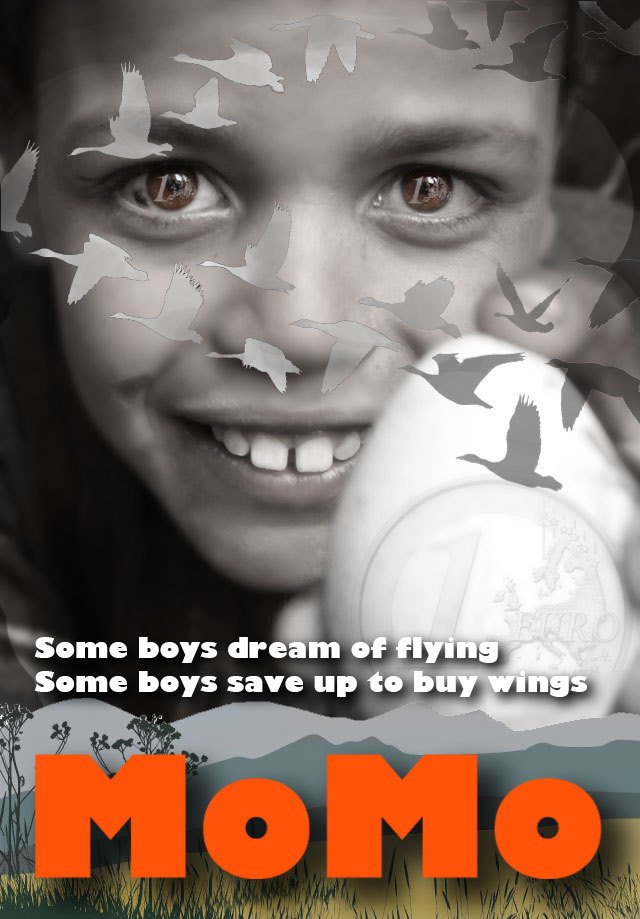
If you’d like to hear more about the story behind this film, please do upvote this post then click here and click the FOLLOW button.
...and of course... would love to hear your comments.
Much Love.
TM
This is something that cannot be forgotten ... thanks for sharing with such heart.
Waiting for more
sonic-sonny
Downvoting a post can decrease pending rewards and make it less visible. Common reasons:
Submit
This post received a 2.8% upvote from @randowhale thanks to @tarquinmaine! For more information, click here!
Downvoting a post can decrease pending rewards and make it less visible. Common reasons:
Submit
Want a boost? Click here to read more!
Downvoting a post can decrease pending rewards and make it less visible. Common reasons:
Submit
This post has received a 0.19 % upvote from @booster thanks to: @tarquinmaine.
Downvoting a post can decrease pending rewards and make it less visible. Common reasons:
Submit
I pray you will get funding to make this film... so all people can find out more about the unbelievable reality that most Human beings are living.
Thank you so much for sharing this, I was truly moved.
Downvoting a post can decrease pending rewards and make it less visible. Common reasons:
Submit
Good post
Downvoting a post can decrease pending rewards and make it less visible. Common reasons:
Submit